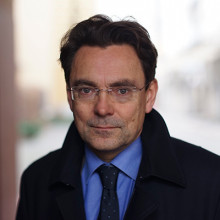Polish literature

Dariusz Karłowicz
Born in 1964, Dariusz Karłowicz is a philosopher, essayist, journalist, academic, book publisher, and a social activist. He graduated in philosophy from the Catholic Theology Academy in Warsaw. In 1995, he joined a group of young scholars and journalists in founding the Warsaw Political Criticism Club – an academic institution aiming to shape intellects through working together on the classic philosophical texts and running university classes. In 1997 he took his PhD at the Philosophy and Sociology Institute of the Polish Academy of Sciences. In 2003 he joined Marek Cichocki and Dariusz Gawin in creating Political Theology – one of the most influential communities in Central Europe, gathering intellectuals, scholars, and young academics. They have organized over one hundred debates, conferences, lectures, and film screenings, and have published around thirty books. Their flagship publication is the Teologia Polityczna yearly, and the Trzeci punkt widzenia [Third Point of View] television series, broadcast by TVP Culture.
It would be a daunting challenge to list all of Dariusz Karłowicz’s fields of activity, with his successes in business (marketing director and council member of Allianz Polska), charity (founder and chairman of the St. Nicholas Foundation), museums (a member of the team that developed the concept for the Warsaw Rising Museum), intellectual endeavours (co-organizer of the Lucieński Seminars), and public projects (he initiated and helped to organize the Three Kings’ Procession). And yet we cannot omit this work, because these experiences have informed his journalism and essays.
A particularly important place in Karłowicz’s work is occupied by The Arch-Paradox of Death (1st edition – 2000, 2nd edition – 2007). The subject of his investigations here was the martyrology of the first Christians, measured up not to Church hagiography, but to classical Greek philosophy. His approach was exceptional in that it treated martyrdom as a philosophical category. This erudite work compared, on the one hand, the works of Aristotle, Diogenes Laërtios, Epictetus, and Plato, and on the other, the writings of Justin Martyr, Clement of Alexandria, Origen, and Tertullian. Studying the works of the ancient Greek thinkers and the old Church Fathers, he arrived at the startling conclusion: that no one better than the latter fulfilled classical Greek philosophy’s ideal of the perfect life. To their mind, practising philosophy was a way of preparing for death, an exercise on dying. The compelling proof of the Christian testimonial of death convinced many thinkers of the time, who could not help but compare Jesus and Socrates. Karłowicz’s work casts new light on the links between Greek philosophy and the Christian religion. As Professor Maria Dzielska opined: “This inspiring book fills a major gap in our understanding of the paradox of choosing martyrdom and death, whether by an ancient wise man or a witness of Christ in the epoch of persecution.”
A similar thought pattern marks another book by Karłowicz, Socrates and Other Saints (2005). In this brilliant essay Karłowicz demonstrates, as in his earlier work, the correspondences between Greek philosophical intuition and the Christian message – it is their synergy that gave the new religion its remarkable dynamic. The author shows how Europe grew out of this heritage – a synthesis of faith and reason. In order to prove this he goes to the source, to the first centuries of the Christian era, which saw a meeting between Athens and Jerusalem, Academia and the Church. As Professor Karol Tarnowski writes: “This fantastically written, erudite, and important book gives us a new perspective on the relationship between faith and reason in the early Christian thinkers. The author tears down the stereotypical formulae, making a fundamental distinction between early Christianity’s approach to philosophy, and to reason as such. While it could be highly critical toward philosophy, reason itself was never negated, and it triumphs in the critique of false Gnosis."
The author’s fascination with the ties that bind the present day and ancient times also appears in his essay collection The End of Constantine’s Dream (2004). This is the most journalistic of Karłowicz’s books, in which he attempts to outline the meta-political foundation of today’s political quarrels. He introduces the issue of identity in the postmodern world, and relationships between memory and politics, and their impact on the community. Yet he always does this with reference to concrete examples from public life.
In all of Karłowicz’s writings we find the motif of the present importance of the old masters’ words, whether these be the Greek philosophers or the Church Fathers. Through his optic these are no archaeological fossils. Their problems are our problems, because the world we inhabit is much the same – a world where Christianity is not an evident choice, and we must be forever seeking responses to the questions concerning our identities, good and evil, the meaning and the aim of life. Karłowicz finds these answers in the old masters, who teach us how to live in accordance with the classical triad: good, truth, and beauty.
Grzegorz Górny
BIBLIOGRAPHY
- Arcyparadoks śmierci: męczeństwo jako kategoria filozoficzna – pytanie o dowodową wartość męczeństwa, Kraków: Znak, 2000.
- Koniec snu Konstantyna: szkice z życia codziennego idei, Kraków: Księgarnia Akademicka, 2004.
- Sokrates i inni święci. O postawie starożytnych chrześcijan wobec rozumu i filozofii, Kraków: Fronda, Ośrodek Myśli Politycznej, 2005.
- Trzeci punkt widzenia (z Markiem A. Cichockim i Dariuszem Gawinem), Warszawa: Teologia Polityczna, 2016.
TRANSLATIOND
english:
- The Archparadox of Death: Martyrdom as a Philosophical Cathegory, Peter Lang Verlag, 2016.
- Socrates and the Other Saints: Early Christian Understandings of Reason and Philosophy, tłum. Artur Sebastian Rosman, wstęp Remi Brague, Wipf and Stock, 2017.